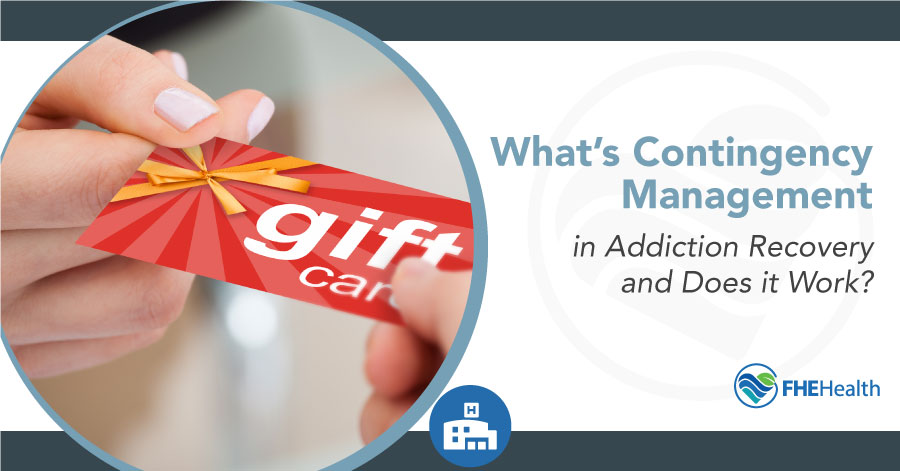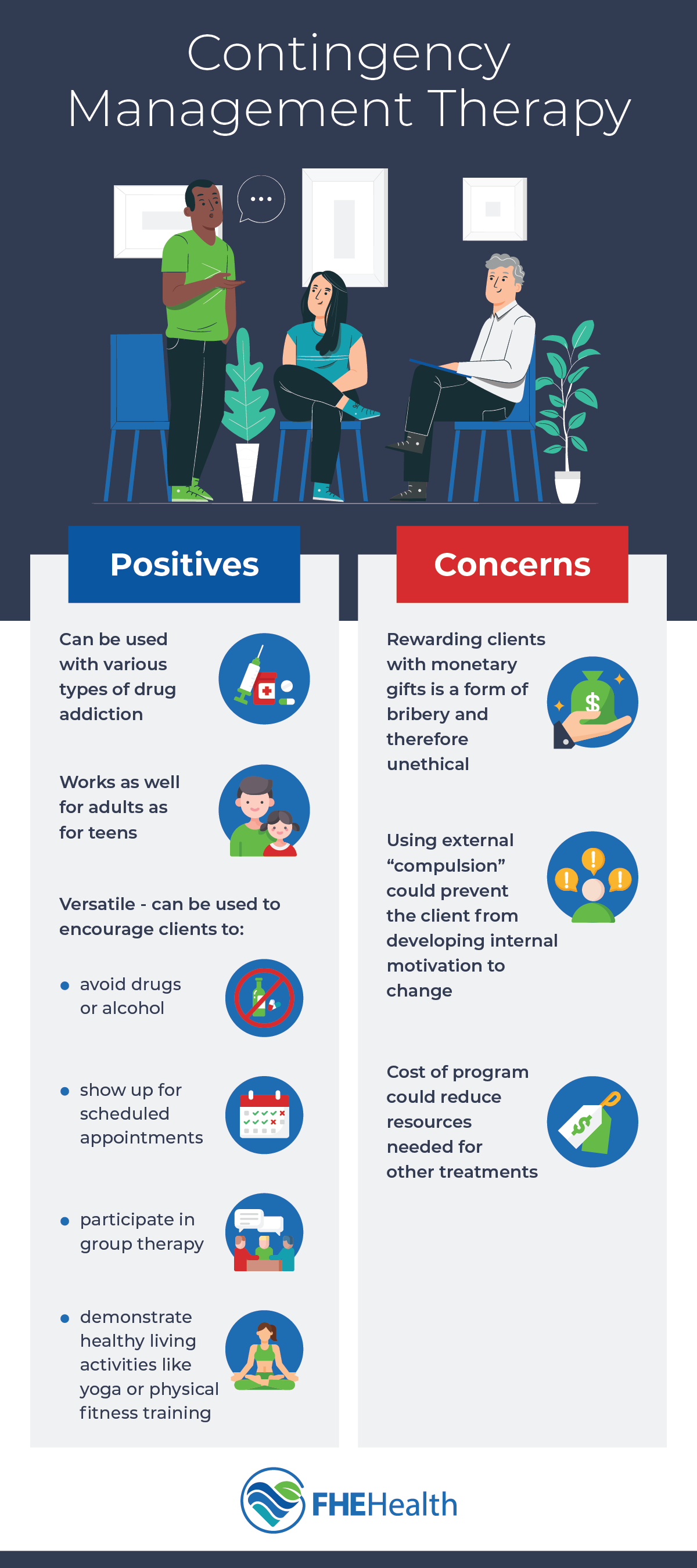
Updated May 6, 2023
The National Institute on Drug Abuse reports that 40% to 60% of people with substance abuse disorders relapse after they leave rehab. However, no client is untreatable — no matter how many times they relapse. Like a depression patient can adjust their medication, a substance use client can try a different treatment, such as contingency management therapy.
The concept of rewarding positive behavior with positive reinforcement or some type of tangible reward is not a new one. It operates according to the simple premise that an individual, when rewarded for positive behavior, is likely to continue that behavior. The same premise informs approaches to parenting that reward children for behaving well (as opposed to punishing their bad behavior).
Some addiction clinics have adopted the same concept in the treatment of addiction, where “contingency management” (as it’s called) is somewhat controversial. Contingency management in the treatment world entails rewarding individuals for getting and staying sober and can involve various types of reward systems. Sobriety is the ultimate goal, but contingency management therapy provides incentives along the way. Research suggests that tangible reinforcement can help residents stay sober. This method also adds some enjoyment to therapy, encouraging residents to keep going. Here, we’ll provide a simple overview of contingency management and the latest research associated with its practice.
How Contingency Management Works in Addiction Treatment – An Example
Habits, compulsions, patterns of behavior— read any type of overview about alcohol or drug addiction and you’re likely to come across these terms referring to key aspects of addiction development and progression. Consequently, medical practitioners must address these aspects of addiction when determining the best course of treatment for an individual, whether that person is addicted to street drugs like heroin, prescription painkillers, or alcohol.
Individual therapy helps patients take a closer look at their habits and patterns of behavior and how these may have paved the way to addiction, a chronic condition that is governed by a compulsion to use an addictive substance despite its negative effects. In this process, therapists may employ a variety of approaches. Contingency management is one such strategy.
Here’s an example of how it might work:
A person who has turned to alcohol for years to alleviate stress has established an unhealthy behavioral pattern. The truth is alcohol provided some comfort. Drinking may have felt like its own reward. Of course, using alcohol to assuage stress or negative emotions is a driver of their addiction, so therapists must help the alcoholic “undo” their habit. One way is to provide a reward (positive reinforcement) to clients who stay sober. Vouchers exchanged for movie passes or some other type of gift are one example of a reward. (More controversially, some therapists have been known to allow clients with opiate addictions to bring their methadone home.)
The general idea, though, is that a positive reward will help to establish healthy patterns of behavior. Many people enjoy this rewards system, because it provides an extra incentive for maintaining their sobriety— especially in the initial weeks and months of recovery, when the relapse risks are high. Many see contingency management as an additional safety net to help this vulnerable population keep on track with recovery.
What Exactly Is Contingency Management?
Sometimes contingency management is voucher-based reinforcement for good behavior among people recovering from addiction. Sometimes it’s referred to as “operant conditioning” or “prize incentives therapy.” There are contingency management examples in the treatment of addiction, but each is geared to provide some type of reward or incentive for people who maintain sobriety or hit certain treatment milestones.
The hallmark of contingency management plans is that they rely on positive reinforcement, which is in stark contrast to society’s punishing protocols for drug use or possession (i.e. prison). Some treatment programs provide vouchers for restaurants, movie theaters, or other products/services that may be associated with healthy, sober living. Some studies have shown, according to Psychiatric Times, that voucher programs can reduce relapse and promote continued abstinence. Many people struggle in rehab when they see no end in sight. Rewards celebrate their achievements and provide something to look forward to, encouraging them to stay sober. They build habits that help them maintain sobriety when they graduate from the program.
Therapists who favor contingency management for addiction find that it helps to modify clients’ behaviors. For example, clients who test negative for drugs and alcohol several weeks in a row may be rewarded with gift certificates or even electronics.
Examples of Contingency Management Therapy
If a child passes a math test, their teacher may reward them with a sticker or prize ticket. Likewise, rehab counselors reward clients for good behavior with money, prizes or vouchers. A resident who passes a drug test or has a therapeutic breakthrough receives a gift card that triggers their brain’s reward system, encouraging them to progress further so they receive more gifts.
Similarly, a client who fails a drug test or skips therapy receives no incentive, theoretically making them wish they had completed the task. The counselors discipline them without giving an outright punishment.
Is Contingency Management Therapy Successful?
A National Library of Medicine study revealed that tangible reinforcement successfully treats drug addiction. Individuals with opioid or cocaine addictions experienced the best results, but people who used tobacco or multiple drugs had some success. The reward system made it easier to avoid cravings and focus on therapy.
Like any treatment, this program isn’t a cure. Residents can undergo any type of therapy, including contingency management, and still relapse after they leave rehab. Still, clinics that adopt this program may increase their clients’ chances of staying sober and treat residents who don’t respond to other types of care.
Contingency Management Concerns
Aren’t sobriety and improved health their own rewards? Some in the medical community certainly think so and have been critical of the practice of rewarding sober living with vouchers, gifts, perks, privileges, or other rewards. Some say that offering a patient a smartphone for staying sober is just as questionable a medical treatment as offering a patient a connective device to lose weight or stop smoking. On the other hand, could this type of positive reinforcement be applied to other areas of healthcare, too?
But there are other concerns regarding this controversial therapy. Some clinicians believe that rewarding clients with monetary gifts is a form of bribery and, therefore, unethical. Some suggest that using an external form of “compulsion” could undermine and prevent the client from developing the internal motivation needed to achieve lasting change. Then, of course, there is the cost of these programs, which can reduce resources needed by other aspects of treatment.
Positive Aspects of Contingency Management for Addiction Treatment
There is evidence that positive reinforcement associated with contingency management can be used with various types of drug addiction. For instance, it appears to work whether the individual is addicted to cocaine, marijuana, or some prescription drugs. Some studies have followed clients for up to a year and noted continued sobriety at a rate higher than clients who did not participate in contingency management programming. There is also empirical evidence to suggest that this type of therapy works as well for adults as teens.
Another positive aspect of contingency management is that it’s versatile. It can be used to encourage clients to avoid drugs or alcohol as well as to show up for their scheduled appointments, participate in group therapy, or demonstrate healthy living activities like participation in yoga or physical fitness training.
Barriers to Contingency Management Therapy
Health Affairs points out that federal and state laws limit the monetary amount that therapists can give clients. This aims to keep providers from bribing patients to complete certain activities, such as paying for unnecessary treatment. However, a Wiley Online Library study reveals that higher rewards lead to better outcomes.
According to a National Library of Medicine study, some experts describe tangible reinforcement as “bribery” that doesn’t encourage the client to stay sober after they leave treatment. When the reward disappears, they could quickly relapse. Some also believe rehab centers shouldn’t reward residents for doing what they signed up to do. Others worry about the expense that contingency management incurs.
Still, studies suggest that clients respond well to contingency management, leading rehab centers to continue offering the therapy. Some have offered at least $500 in bonuses.
When Is Contingency Management Most Beneficial?
It’s unclear if contingency management can help anyone with addiction. For example, there is evidence that this type of treatment may not provide a demonstrable benefit for individuals with a dual diagnosis in association with relapse; however, there has been evidence that dual diagnosis clients show up to therapy 50 percent more often when participating in a contingency management plan.
Addiction treatment centers that employ contingency management as part of their overall treatment strategy generally provide this therapy to all of their clients, regardless of what they’re addicted to, if they have multiple addictions, or are also suffering from a dual diagnosis. As a relatively controversial therapy, there’s a strong likelihood for further study that may help practitioners understand if there are longer-term benefits of this treatment or if it should only be employed in certain situations or for a specific time period. Strong criticism of these programs also necessitates more careful study to determine the potential for negative consequences of contingency management practices.
FHE Health is a behavioral health and addiction treatment center with a strong focus on evidence-based therapies and a step-down continuum of care. As clients grow stable and more confident in their ability to manage their addiction, they transition to less structured treatment programs. We’re able to provide treatment no matter where individuals happen to be in their recovery journey. If you are struggling with an addiction to alcohol or drugs, contact us to learn more about our enrollment process. We individualize treatment to suit each client’s needs.







